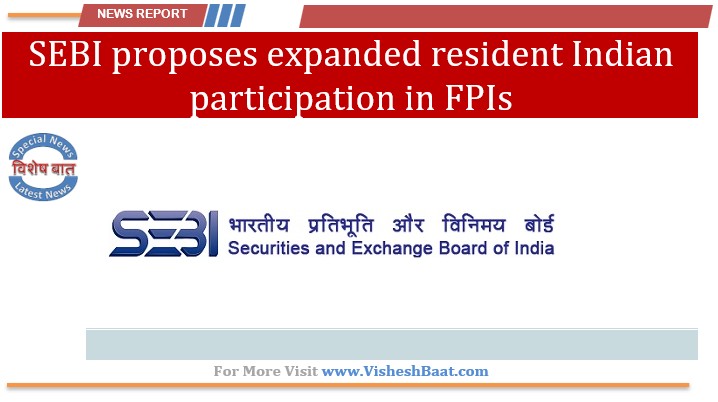SEBI recently released a consultation paper proposing streamlined procedures for resident Indians to participate in Foreign Portfolio Investors (FPI) routes. The aim is to simplify eligibility, KYC, custodial norms, and tax-related aspects so individuals and domestic entities can more easily invest in global asset classes—balancing liberalization with safeguards.
SEBI’s consultation paper: opening the gate for more Indian investors
The Securities and Exchange Board of India (SEBI) this week published a consultation paper outlining proposed changes aimed at increasing resident Indian participation in the Foreign Portfolio Investor (FPI) framework. In plain terms, the regulator is looking at ways to make it easier for Indian individuals and entities to invest in overseas portfolios through the FPI route, removing some procedural friction and clarifying eligibility and compliance steps. The move appears driven by two goals: deepen domestic access to global markets and also bring more clarity and transparency to how resident capital can be channelled into international securities while still meeting India’s regulatory and tax considerations. If adopted, the proposals would mark a policy shift that balances liberalising capital flow access with preserving necessary safeguards.
What the changes could mean for retail and institutional investors
For retail investors and smaller Indian institutions, the proposed measures could expand choices beyond purely domestic equities and mutual funds, enabling diversified exposure to overseas asset classes via a regulated FPI structure. This could mean access to equities, debt instruments and other financial products abroad through better-defined on-ramps. For wealth managers and domestic intermediaries, clearer rules could lower operational costs of onboarding and monitoring such investor flows. However, the consultation paper also signals careful calibration: SEBI is seeking stakeholder feedback on eligibility criteria, KYC norms, custodial arrangements, tax treatment and reporting. Those details will determine whether the changes truly simplify access or merely add layers of paperwork that only the largest players can manage.
Risks, implementation and timing to watch
Even if the spirit of the proposals is liberalising, watchdogs and market participants will be scrutinising the proposals for systemic risk controls. Opening up resident participation in FPIs raises issues around currency flows, external borrowing limits, tax treaty interactions and cross-border surveillance. SEBI’s consultation phase invites comments — meaning any final rules could be months away and will likely be phased. Market reaction will depend on specifics: a practical, low-friction framework could spur fresh retail interest and outbound allocation; a complex framework could end up mainly benefiting institutional players. This is a developing regulatory story that investors, fund managers and policy watchers in India should follow closely.
हिंदी अनुवाद
SEBI का परामर्श पत्र: भारतीय निवेशकों के लिए द्वार खोलना
Securities and Exchange Board of India (SEBI) ने इस सप्ताह एक परामर्श पत्र जारी किया है जिसमें Foreign Portfolio Investor (FPI) ढांचे में निवासी भारतीयों की भागीदारी बढ़ाने के प्रस्ताव रखे गए हैं। सरल शब्दों में, नियामक यह देख रहा है कि किस तरह भारतीय व्यक्ति और संस्थाएँ FPI मार्ग के माध्यम से विदेशी पोर्टफोलियो में निवेश करना आसान बना सकें — प्रक्रियात्मक बाधाओं को घटाकर और पात्रता व अनुपालन मानदंडों को स्पष्ट करके। यह कदम घरेलू निवेशकों को वैश्विक बाजारों तक पहुंच बढ़ाने और साथ ही भारत के नियामक व कर सुरक्षा तंत्रों को बनाए रखने दोनों उद्देश्यों द्वारा प्रेरित दिखता है। यदि पारित हुआ, तो ये प्रस्ताव एक ऐसा नीति बदलाव हो सकता है जो पूंजी प्रवाह की सुविधा और ज़रूरी सुरक्षा के बीच संतुलन बनाए।
खुदरा और संस्थागत निवेशकों के लिए क्या मायने रखेगा
खुदरा निवेशकों और छोटे संस्थानों के लिए ये प्रस्तावित बदलाव घरेलू इक्विटी और म्यूचुअल फंड से परे विकल्प खोल सकते हैं — एक नियंत्रित FPI संरचना के जरिये विदेशी परिसंपत्तियों तक विविधित एक्सपोज़र मिल सकता है। इसका मतलब यह हो सकता है कि निवेशक विदेशी शेयर, डेट इंस्ट्रूमेंट और अन्य वित्तीय उत्पादों तक बेहतर परिभाषित रूट के जरिये पहुंच पाएँगे। वेल्थ मैनेजर्स और घरेलू इंटरमीडियरीज के लिए स्पष्ट नियम ऑनबोर्डिंग और निगरानी की लागत घटा सकते हैं। फिर भी, परामर्श पत्र संकेत देता है कि नियामक सावधानी से माप-जोख कर रहा है: SEBI ने पात्रता, KYC, कस्टोडियल व्यवस्था, कर व्यवहार और रिपोर्टिंग पर फीडबैक मांगा है — और यही विवरण तय करेंगे कि परिवर्तन वास्तव में सरलता लाएगा या केवल बड़े खिलाड़ियों के लिए ही व्यावहारिक रहेगा।
जोखिम, कार्यान्वयन और समय-सीमा पर नजर
भले ही प्रस्ताव उदारीकरण की भावना रखते हों, पर यह भी सच है कि निगरानी एजेंसियाँ और बाजार प्रतिभागी जोखिम नियंत्रणों पर कड़ी निगरानी रखेंगे। निवासी भागीदारी खोलने से मुद्रा प्रवाह, बाहरी उधारी सीमा, कर संधि प्रभाव और सीमा पार निगरानी जैसे मसले उठते हैं। SEBI ने परामर्श चरण शुरू किया है — इसका मतलब है कि अंतिम नियमों तक पहुँचने में महीनों लग सकते हैं और संभवतः चरणबद्ध कार्यान्वयन होगा। बाजार की प्रतिक्रिया इन विशिष्टताओं पर निर्भर करेगी: यदि फ्रेमवर्क व्यावहारिक और कम बाधा वाला निकला तो खुदरा रूचि और आउटबाउंड अलोकेशन बढ़ सकती है; यदि जटिल बना तो मुख्यतः संस्थागत खिलाड़ी ही इसका लाभ उठा पाएँगे। यह विकासशील नीतिगत कहानी है जिसे निवेशकों, फंड मैनेजरों और नीति-विवेचकों को नज़दीकी से देखना चाहिए।
